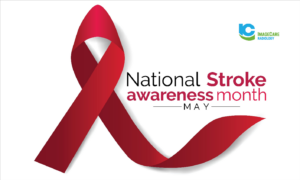How to Recognize A Stroke
May marks National Stroke Awareness Month. As an imaging center in New Jersey, ImageCare Radiology wants to help raise awareness by keeping the conversation going. We all know that strokes are undesirable medical emergencies. But did you know that strokes are the fifth leading cause of death in the United States? Well now you do. Preventing strokes from happening would be ideal, but even when you know your risk, they can often still be quite unexpected. When you, a friend, loved one, or a stranger in a restaurant has a stroke, you want to be prepared if and when a stroke happens.

What is a stroke?
A stroke is when the flow of blood to your brain is interrupted. Most strokes are called ischemic strokes, in which a blood clot blocks the flow of blood to the brain. The other type of strokes is called a hemorrhagic stroke, in which a weakened blood vessel bursts, causing bleeding in the brain. Strokes cause temporary or sometimes permanent disabilities depending on how severe the stroke was and how long the flow of blood to the brain was suspended.
How can I recognize when a stroke is coming on?
Recognizing the signs of a stroke is crucial in getting emergency medical treatment as quickly as possible, which helps minimize the damage caused by the stroke. The most common signs and symptoms of a stroke include:
- Sudden weakness or numbness in the face, arm, or leg, especially on one side of the body.
- Sudden confusion, trouble speaking or understanding speech.
- Sudden trouble seeing in one or both eyes.
- Sudden trouble walking, dizziness, or loss of balance or coordination.
- Sudden severe headache with no known cause.
When strokes happen, they happen fast. Use the acronym FAST to remember the signs of a stroke:
- F – Face drooping: Is one side of the face drooping or numb?
- A – Arm weakness: Is one arm weak or numb? Ask the person to raise both arms. Does one arm drift downward?
- S – Speech difficulty: Is the person’s speech slurred or hard to understand? Ask the person to repeat a simple sentence.
- T – Time to call 911: If you observe any of these signs, call 911 immediately.
Call 911 or emergency services immediately in the event that you witness someone experiencing any of these signs. Time is critical in treating a stroke, and getting medical treatment as soon as possible vastly improves the chances of recovery.
ImageCare Radiology is an imaging center in New Jersey offering diagnostic services to help ascertain the cause of a stroke. Contact us to learn more about what we do or to schedule an appointment.